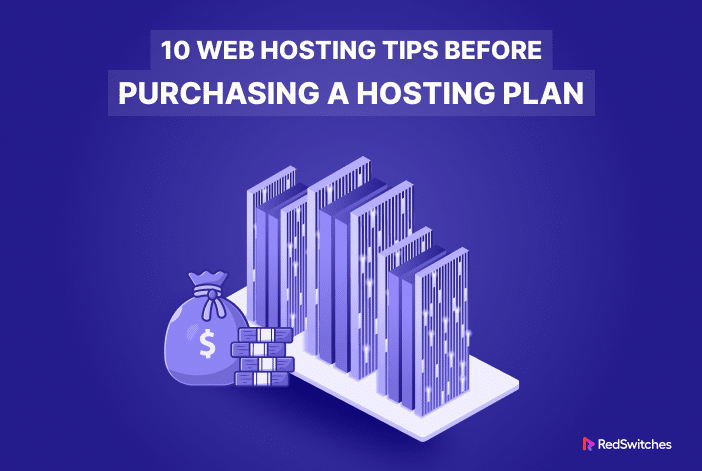Everybody knows that web hosting directly affects the performance of your website.
However, picking the right web hosting is surprisingly challenging with so many hosting providers and solutions in the market. That said, making the right decision is much easier when you know what to look for in a web hosting service.
So, read along and discover the 10 most important web hosting tips to help you choose the perfect web hosting service for your business. Finalizing one from many options can be overwhelming, and these hosting tips will guide you through the process. We’ll help you make an informed choice that aligns perfectly with your website’s needs and goals.
Let’s start with a detailed look at web hosting and how it works.
Table Of Contents
- What is Web Hosting?
- Why It’s Important To Choose the Right Web Hosting Provider
- The 10 Real-Life Database Examples
- Hosting Tip #1: Define Your Hosting Requirements
- Hosting Tip #2: Consider Getting Dedicated Hosting
- Hosting Tip #3: Read Reviews Before You Buy
- Hosting Tip #4: Don’t Compromise on Essential Security Features
- Hosting Tip #5: Look for High Uptime
- Hosting Tip #6: Consider Backup Options
- Hosting Tip #7: Check Software Compatibility
- Hosting Tip #8: Test Out Customer Support
- Hosting Tip #9: Be Wary of “Too Good To Be True” Offers
- Hosting Tip #10: Read the Contract Terms & Conditions
- Conclusion
- FAQ
What is Web Hosting?
Web hosting, a core service provided by hosting providers, enables website owners to make their websites accessible online. A web hosting provider offers the necessary hardware and software infrastructure to host the website.
The various types of web hosting include:
- Dedicated Web Hosting Solution
- Managed Servers
- Cloud Hosting
- Virtual Private Servers
- Shared Servers
These hosting options differ primarily in the number of tenants on the server, the level of management required for hosting websites, the control panel, and the additional services offered by the hosting provider.
When selecting a web hosting plan, consider aspects such as custom domains, extra features, renewal prices, the provision of email addresses, and the duration of the hosting plan. We strongly recommend getting domain privacy to safeguard your personal information included with the domain registration data.
How Does Web Hosting Work?
The web hosting provider generally provides a space on their infrastructure. This space can be a shared slot on a server or an entire server, depending upon the type of hosting solution.
You upload the data for your website onto the server and go through the steps (pointing a domain and configuring name servers) to make your website accessible online. Once done, anyone can access your hosted data through your web address.
Although you can host a website by yourself on your server, it requires quite a lot of technical skills and resources for server management. That’s where web hosting service providers come in. These providers monitor and maintain the hosting servers, allowing you to focus on your business.
Why It’s Important To Choose the Right Web Hosting Provider
Selecting the appropriate web hosting provider is a critical decision that can make or break your online venture. The reliability and efficiency of your hosting provider can either bolster your business or hinder its progress.
Opting for a dependable hosting service ensures users can access your online services without interruptions. Similarly, you must ensure the website loads quickly and experiences minimal downtime, as potential customers are unlikely to wait for a sluggish site.
Your choice of hosting provider becomes even more significant when you plan to expand your server’s capabilities. Ideally, your hosting provider’s infrastructure should be able to keep pace with your growing business requirements. This scalability becomes a critical operational requirement for businesses such as eCommerce stores and SaaS products as they receive more visitors.
While you’re there, discuss the need for additional capabilities, such as custom configurations and resource monitoring components. These capabilities become significant as you start focusing on website performance.
You should also understand the role of the hosting solution in high search engine rankings. An always-available website that loads lightning-fast is essential for search engine optimization strategies. Making an informed choice is vital for your online presence’s sustained success and growth.
The 10 Web Hosting Tips For A Great Online Presence
Without further ado, here are the ten most crucial web hosting tips:
Hosting Tip #1: Define Your Hosting Requirements
Before you look into different web hosting options, it’s essential to outline your hosting requirements.
Of course, it can be challenging to assess what resources your website will need before you launch it. A good starting point is to define the type of website or web application you plan to host and the daily traffic you expect to receive. These two questions will help you narrow down your options.
Additionally, consider the following factors:
- Domain Names and Registration: Determine whether you need to register a new domain. Check if the hosting provider offers domain registration services and easy domain management options.
- Server Location(s): Depending on your target audience and the nature of your website or application, choose a server or data center location that ensures optimal speed and reliable performance for your users. A server closer to your target audience can significantly improve loading times.
- Website Type and Technology: Assess the nature of your website or application. Is it a simple blog, a complex eCommerce site, a forum, or a product website? Consider the programming languages and technologies you’ll use to build and deploy the website.
For example, if you want to host your portfolio, your hosting requirements will be minimal — and very different from an online store.
Make sure the hosting plan supports your preferred technology stack. Each website type has specific hosting needs, so align your hosting choice accordingly.
Hosting Tip #2: Consider Getting Dedicated Hosting
Unless you’re building a small, personal website that won’t receive any significant traffic, you should seriously consider dedicated server hosting.
While shared hosting can be tempting because of its affordability, it is not an optimal option for hosting commercial websites.
Dedicated hosting offers an entire server exclusively for your website, ensuring you have complete control over server resources and configurations. This type of hosting comes with a plethora of advantages, including:
- More resources: Dedicated hosting provides substantial resources, ensuring your website runs smoothly even during traffic spikes.
- Better performance: With dedicated resources, your website’s performance is significantly enhanced, resulting in faster loading times and a superior user experience.
- Increased security: Since you’re the only user on the server, you have complete control over the server’s security. This means you can set up server security the way you see fit.
- More control over your website: You can customize server settings and choose the operating system and other software to suit your website’s specific needs.
- Minimal downtime: Dedicated hosting typically guarantees minimal downtime, an essential requirement for websites that need an uninterrupted online presence.
- Customizable Email Accounts: Dedicated hosting allows you to set up your own or integrate a third-party email platform. You can set up as many email inboxes as you need for your business operations.
Dedicated hosting ensures you won’t have to worry about slow site speed or server downtime, especially when experiencing increased traffic during sales season or product promotions. Consider dedicated hosting for your professional website to benefit from unparalleled control, performance, and security.
Hosting Tip #3: Read Reviews Before You Buy
You’ll be surprised by the number of users who make a snap decision to buy a hosting plan without checking out the reviews.
Reviews can give you an idea of users’ most common issues with a hosting provider. What’s more, reviews allow you to see how (if at all) the hosting provider handles user complaints and whether they value user feedback.
Look for reviews highlighting top-notch performance, helpful customer support, and feedback from users who found the hosting provider to be the perfect choice. A well-rounded understanding of various reviews can help you shortlist the best hosting provider for your needs.
Hosting Tip #4: Don’t Compromise on Essential Security Features
Website security should be a top priority when choosing a web hosting provider.
To choose the best web hosting, look for a hosting plan that includes:
- Secure Sockets Layer (SSL) Certificate that establishes secure connections and transactions.
- DDoS protection to mitigate denial-of-service attacks is essential, especially for shared hosting plans.
- Web Application Firewall to prevent Application-layer attacks.
- Data protection, such as GDPR compliance.
- Email throttling sets the maximum amount of emails you can send per hour to prevent bots from using your email for spam.
Consider advanced security features even if they come with a more expensive plan. Prioritize both performance and security to avoid potential performance issues. Additionally, inquire about performance upgrades and ensure your hosting plan provides sufficient resources that keep pace with your growing website needs.
Hosting Tip #5: Look for High Uptime
Server downtime prevents users from accessing your website. An inaccessible website can lead to a loss of reputation, customers, and revenue.
You should always research the uptime guarantee statement of the hosting providers because it’s a critical requirement for business continuity.
Generally speaking, the closer to 100% guaranteed uptime is, the better. Of course, not all hosting providers can guarantee 100% uptime. Usually, you should aim for a 99.5% to 99.9% uptime.
Uptime guarantees should also be backed by a money-back guarantee, ensuring that if your website experiences unexpected downtime beyond the specified limit, you may be eligible for a partial or total refund or compensation.
Uptime guarantee often correlates with an excellent average response time. Assess the hosting provider’s server speed and ensure it meets your requirements.
Additionally, consider features such as domain hosts, control panel options, and the ability to manage the server that enhance your hosting experience.
Hosting Tip #6: Consider Backup Options
Unfortunately, server crashes, cyber-attacks, and other unexpected events can result in data loss. For this reason, data backup is another vital web hosting feature you should consider carefully.
Backup and associated recovery processes allow you to bring your website back online after a security incident. For this, you or the provider use a recent backup archive that is stored at a secure location. This archive is used to restore the website data and configurations during the recovery process.
Ideally, you want a web hosting plan that includes auto backups. If auto backups/daily backups are unavailable, look for a plan that allows you to back up your website yourself easily.
During evaluation, assess the control options for managing backups and ensure they align with your needs. Backup solutions are especially crucial for larger businesses or business owners and should cover varying periods to cater to different scenarios.
Hosting Tip #7: Check Software Compatibility
Software compatibility is a crucial factor that many users overlook when evaluating web hosting plans.
At the very least, you should check if the server’s operating system is compatible with the software you plan to deploy on the server. This is especially important if you work with apps available on a specific operating system.
For instance, if you plan on using legacy apps that run on Windows OS only, choose a package that comes with a Windows OS server to avoid problems with website operations.
Hosting Tip #8: Test Out Customer Support
Reliable and responsive customer support is critical to effectively dealing with website issues.
The best hosting providers will offer multiple channels for contacting customer support, like live chat, phone, and email. Regardless of the channels, customer support must be available 24/7.
That said, it’s not enough to get help quickly. You also need to ensure the customer support is knowledgeable and capable of providing high-quality support.
So, before committing to a web hosting provider, contact their customer support to see if it meets your needs and requirements.
Hosting Tip #9: Be Wary of “Too Good To Be True” Offers
Often, web hosting plans include “amazing” offers, like unlimited storage, data transfers, and unlimited bandwidth or unmetered bandwidth.
While these unlimited storage offers are very tempting, in reality, most have strict “Fair Usage” policies that essentially make them useless. So, make sure to read the fine print.
Alternatively, you might contact the hosting provider’s customer service support. This way, you can actually learn what the unlimited offer entails – and whether it comes with any limitations.
For example, some hosting providers offer hosting packages with unlimited bandwidth or unlimited websites. However, they don’t tell you that your disk space or the number of nodes is limited, so in reality, you will probably only be able to host 5-10 mid-size websites.
Be cautious of unlimited offers, especially if you run a business or host larger websites. Assess the available computing resources provided and whether there’s a custom control panel for efficient management. Prioritize a quality experience over claims of unlimited resources, and consider the average uptime guarantees to ensure a reliable hosting service.
Hosting Tip #10: Read the Contract Terms & Conditions
Most users don’t bother reading the contract’s terms and conditions before signing it.
However, hosting service terms and conditions include essential information, such as:
- Limitations and prohibitions of using web hosting.
- Your obligations as a user.
- Data protection details.
- Contract termination clauses.
- Refund policies, and much more.
As such, it’s vital that you carefully read the contract terms and conditions to know what you’re signing up for.
Consider the implications of moderate traffic flow on the contract terms and conditions. Look for providers with a proven track record of customer success and improvements in performance. Assess how the terms handle maximum performance requirements and the minutes of downtime allowances. Understanding the fine print is essential for a trouble-free hosting experience.
Conclusion
Choosing the right web hosting plan is critical for establishing a robust online presence. By following these 10 web hosting tips, you can make an informed choice that aligns with your website’s needs and goals. Research your options thoroughly, consider your budget, and prioritize performance, security, and customer support.
Explore RedSwitches Hosting Plans
With the right hosting plan and provider, your website can thrive and deliver a seamless experience to your visitors. Don’t rush the decision – take your time, assess your needs, and make a choice that sets your online venture up for success.
RedSwitches offer the best dedicated server pricing and deliver instant dedicated servers, usually on the same day the order gets approved. Whether you need a dedicated server, a traffic-friendly 10Gbps dedicated server, or a powerful bare metal server, we are your trusted hosting partner.
FAQ
Q: What is web hosting?
A: Web hosting is a service that allows individuals and organizations to make their websites accessible on the internet. It involves storing your website files on a server and making it available to users who visit your website.
Q: How do I choose a web host?
A: When choosing a web host, consider factors such as the type of web hosting service you need (shared hosting, VPS hosting, etc.), the reliability and reputation of the hosting company, the features and resources they offer, and the price of the hosting plan.
Q: What is shared hosting?
A: Shared hosting is a type of web hosting where multiple websites are hosted on a single server, sharing its resources. It is the most affordable option but may have limitations in terms of performance and scalability.
Q: What is a website builder?
A: A website builder is a tool provided by web hosting companies that allows you to create a website without coding knowledge. It provides a user-friendly interface and pre-designed templates to help you build your website.
Q: What should I consider when choosing a web hosting service?
A: When choosing a web hosting service, consider factors such as the reliability and uptime guarantee, scalability, security measures, customer support, and additional features such as website backups and SSL certificates.
Q: What is the best web hosting service?
A: The best web hosting service depends on your specific needs and requirements. However, some popular web hosting providers that are highly recommended include Bluehost, HostGator, SiteGround, and InMotion Hosting.
Q: What is managed WordPress hosting?
A: Managed WordPress hosting is a specialized hosting service for WordPress websites. It offers optimized server configurations, automatic WordPress updates, enhanced security, and expert WordPress support.
Q: How do I select the right web host for my website?
A: To select the right web host for your website, assess your hosting needs, research different hosting providers, read customer reviews, compare features and pricing, and ensure that the host offers reliable customer support.
Q: What is VPS hosting?
A: VPS hosting, which stands for Virtual Private Server hosting, is a type of web hosting where a physical server is divided into multiple virtual servers. Each virtual server has dedicated resources and operates independently, offering better performance and control than shared hosting.
Q: How do I sign up for hosting?
A: To sign up for hosting, visit the website of the hosting provider you have chosen, select the hosting plan that suits your needs, fill out the necessary information, and proceed to payment. Once the payment is processed, you will receive the login details to manage your hosting account.



